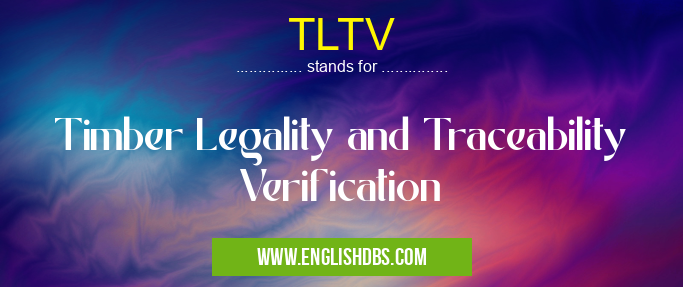What does TLTV mean in LAW & LEGAL
TLTV stands for Timber Legality and Traceability Verification. This is an audit process that is used by many governmental bodies to make sure that the timber being imported or exported into their country has been sourced legally and from sustainable forests. By ensuring that the timber trade is transparent, it helps reduce illegal logging and deforestation, which is damaging to both the environment and local communities.

TLTV meaning in Law & Legal in Governmental
TLTV mostly used in an acronym Law & Legal in Category Governmental that means Timber Legality and Traceability Verification
Shorthand: TLTV,
Full Form: Timber Legality and Traceability Verification
For more information of "Timber Legality and Traceability Verification", see the section below.
Essential Questions and Answers on Timber Legality and Traceability Verification in "GOVERNMENTAL»LAW"
What is Timber Legality and Traceability Verification (TLTV)?
TLTV is an approach to verifying the provenance of timber products, ensuring that they come from a certain legal source, and have followed an acceptable chain of custody. This verification process helps organizations control their risk of inadvertently sourcing illegal timber, and promotes sustainability of forests.
What are the benefits of TLTV?
TLTV provides organizations with increased visibility into the supply chain, enabling them to verify that their wood sources meet regulatory standards. It also helps companies make sure that wood sourced has been harvested legally and ethically, which can bolster customer trust in their brand. Additionally, TLTV can provide companies with the ability to access cost savings by reducing costs associated with compliance with due diligence requirements under the EU Timber Regulation (EUTR) or other international regulations.
Who needs Timber Legality and Traceability Verification?
Organizations that purchase timber for any purpose should consider implementing TLSV as part of their routine operations. Companies involved in importing, trading or processing timber may be legally required to adhere to national or international laws regarding timber traceability and legality. Additionally, any organization looking to protect their brand reputation and demonstrate sustainable procurement practices should also operate under TLTV protocol.
What legal requirements exist for Timber Legality & Traceability Verification?
The European Union has implemented strict legislation aimed at combating illegal logging via its Timber Regulation (EUTR). Under this regulation all importers into the EU must exercise due diligence in verifying that all wood sourced has been harvested legally and sustainably before placing it on the market. Other countries such as Australia have similar legislation requiring traceability protocols when it comes to timber sourcing.
How does someone get certified for Timber Legality & Traceability Verification?
Organizations must undergo an audit conducted by a certified assessor in order for certification to be granted; depending on the scope of operations this can include assessments of policies and procedures related to tracing wood origin, checks against existing validation systems used by suppliers/customers/governments etc., interviews with staff responsible for product tracking processes, product sampling checks etc. Certification will be granted if all criteria have been met satisfactorily.
What types of risks are associated with not using TLTV?
Without using a traceability system there is an increased risk that organizations might inadvertently purchase illegally logged wood without knowing it. There could also be reputational damage done if third parties become aware that a company is purchasing from unregulated sources; customers may choose not to do business if they don't feel confident that they know where their products originate from or how they were produced.
How does one track progress when it comes to following established TLTV protocols?
Progress can be tracked through regular audits carried out by independent third-parties which assess conformance against previously established standards such as those accepted under EUTR regulations. Protocols should also include routine verification processes within daily operations so any issues can be identified quickly before they become larger problems.
Can my organization still use wood that wasn’t verified through a TLSV program?
Generally speaking it's best practice for organizations operating under EUTR regulations to source only materials which have gone through a credible certification process; however there are some exemptions in certain circumstances (e.g., recycled materials). In these cases additional due diligence measures need to be taken in order ensure compliance with applicable legislation.
What tools are available for helping organizations establish traceability systems according to TLSV guidelines?
There are numerous software platforms designed specifically for helping businesses comply with TLTV regulations by leveraging existing technologies such as RFID tags and QR codes allowing them to track products throughout the entire supply chain process.
Final Words:
In conclusion, TLTV stands for Timber Legality and Traceability Verification—an audit process used by many governments to ensure that imported or exported timber is legally sourced from sustainable forests. Through this verification method governments can help protect their local environments, as well as the global environment, from further deforestation caused by illegal logging activities.
